Mapping Digital Food Entertainment
This week I was looking through my credit card bills and I realized something weird. Quarantine has been BRUTAL for my food delivery spending. Before, I would eat a meal at work and somehow muster up the oomph to cook dinner at home. Now, sitting at home 24x7, I have no motivation to cook THREE MEALS a day. With Doordash and Grubhub laughing their way to the bank - I tried to map the world of cooking entertainment to a) Get the motivation to cook & b) Learn how to cook.
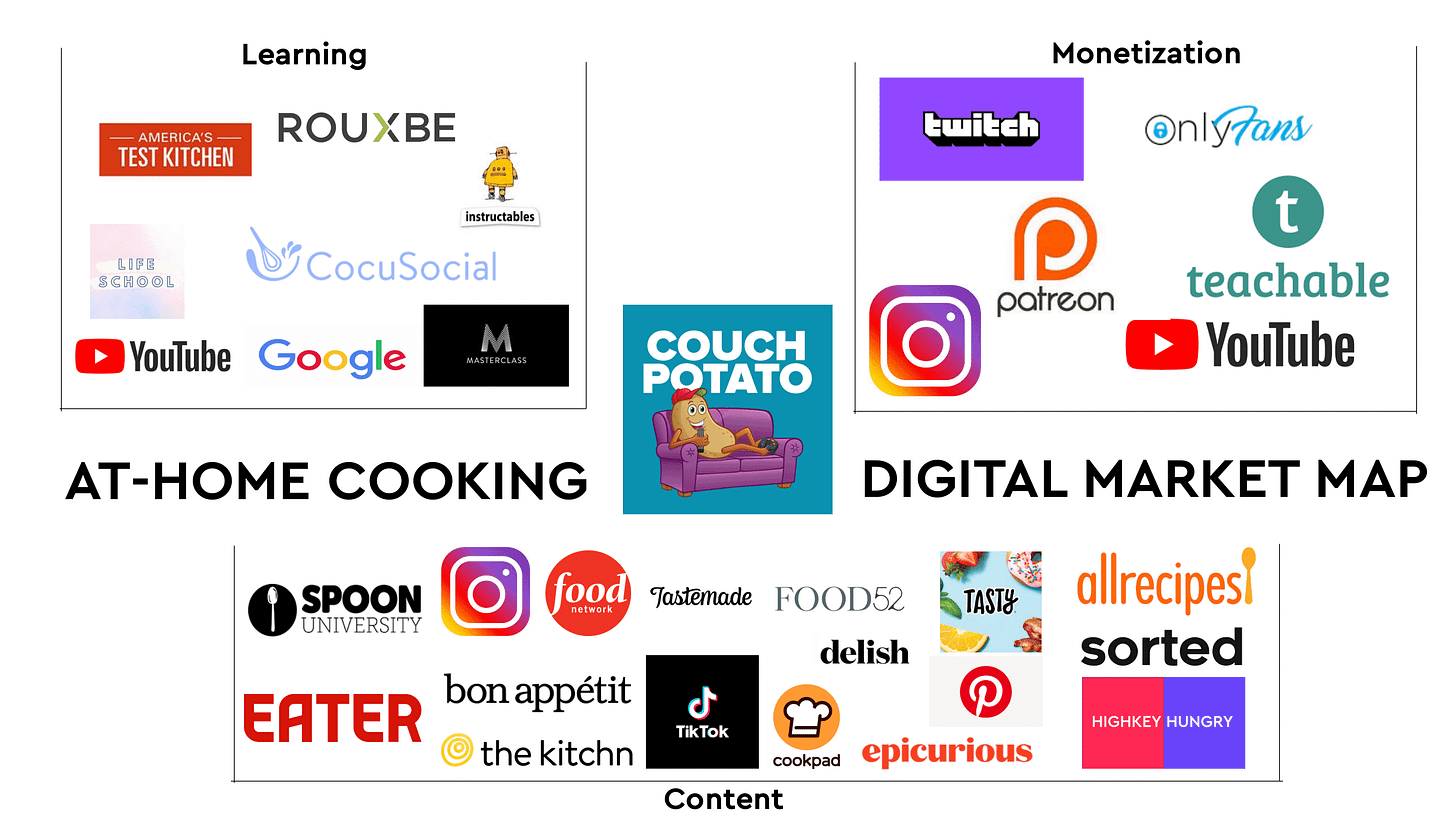
So I focused on food “entertainment” media and split them by where they are used in the customer journey:
- Learning to cook
- Exploring new dishes and ideas for just-in-time cooking & recipes
- Content creation and monetization after cooking
This is a work in progress so hit me with your comments, they will be much appreciated.
- Learning Phase
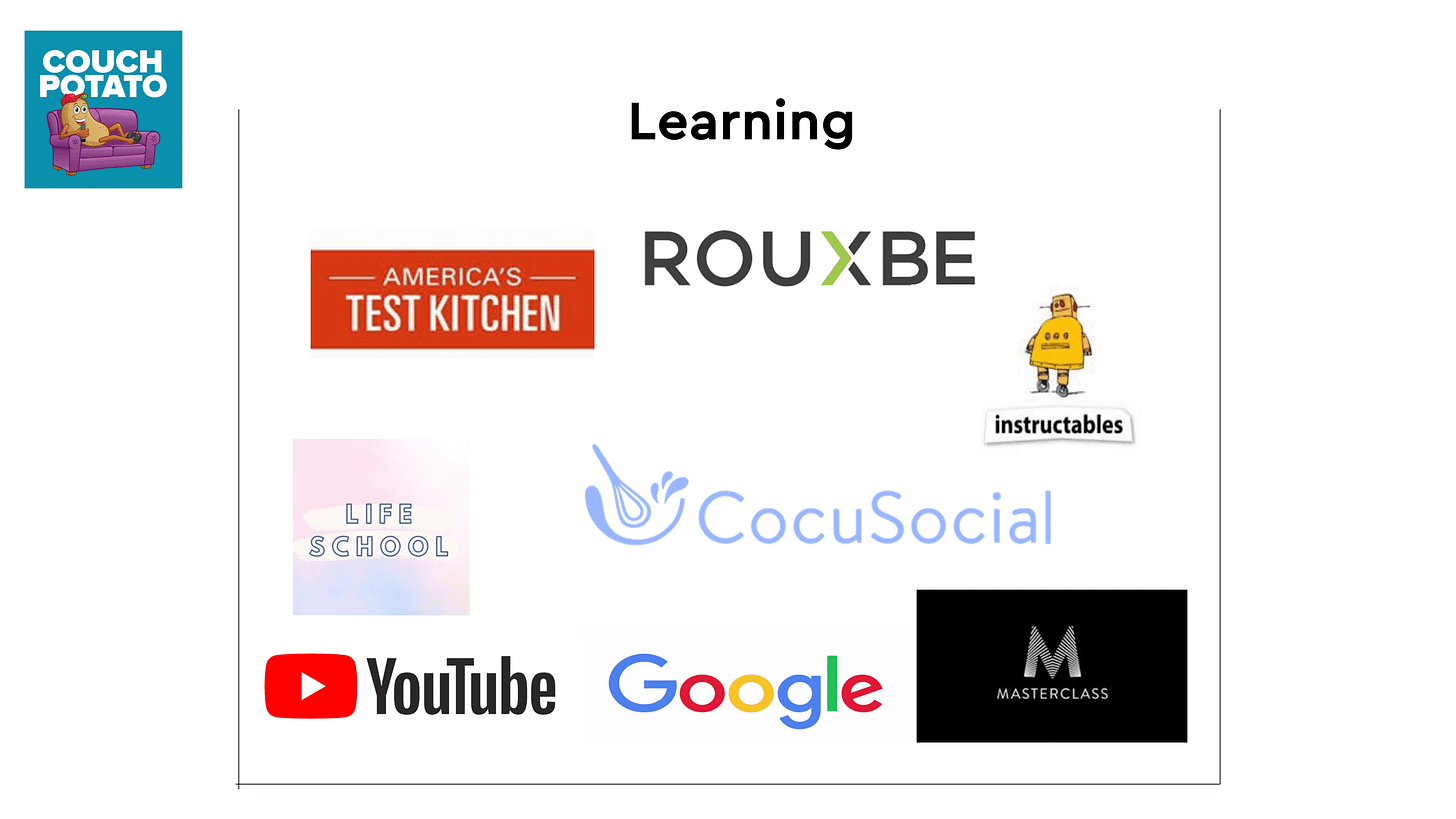
- Millennials cook less than any other generation: Nearly 40% of millennials consider themselves bad cooks. They are also eating in the least - only 4 nights a week.
“Barely a third of Millennials in the Porch.com survey knew how to cook poached eggs; a scant 50% of them knew how to roast a chicken. Only 41% could make salad dressing, possibly the simplest recipe in the culinary canon. Nearly two-thirds were unable to make a chicken salad sandwich.”
Daniel Payne, USAToday
The first step is learning how to cook. Competent home cooks commonly learn cooking by observing and helping their parents cook. For the rest of us, it is an endless saga of googling and watching videos.
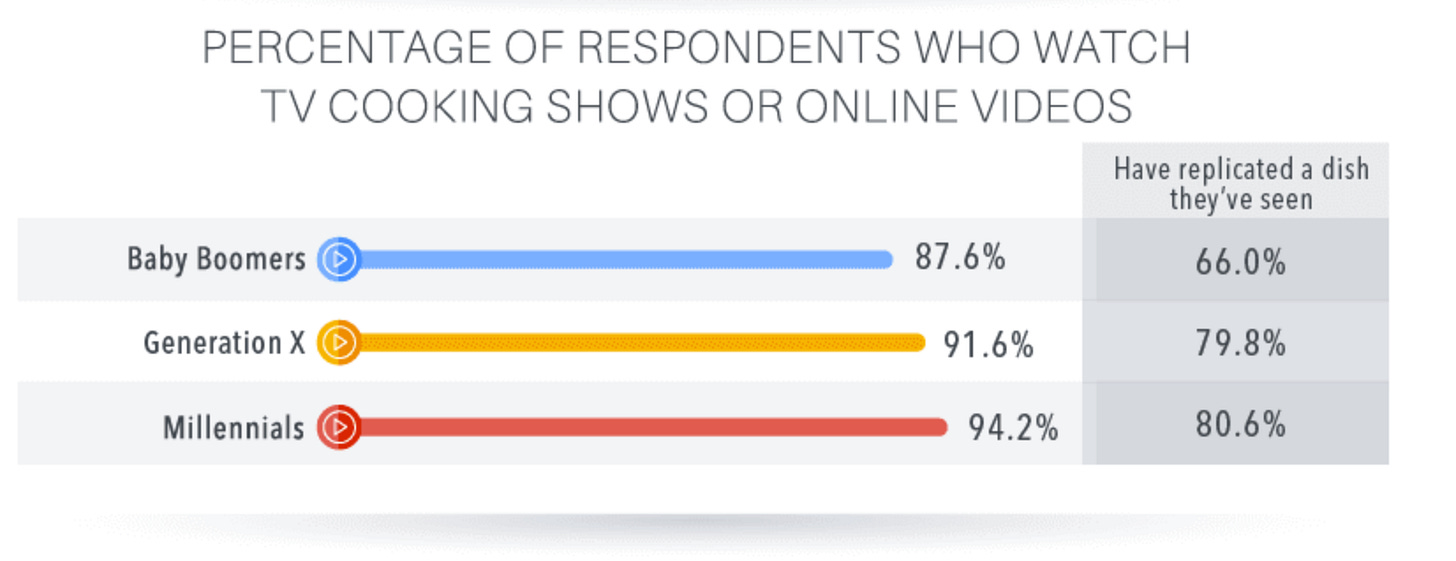
- Learning to cook is non linear
Beginners like me might whip up some delicious chicken marsala, but suck at hard boiling eggs. How do you teach me cooking? Where do you start?
As a result, most cooking learning is just-in-time. Googling “How to filet a fish” after I have decided that I am going to try making fish filet. In this category, Youtube and Google reign supreme.
There are incumbents that try to teach cooking in a more traditional online manner - sequentially, in modules with videos. Have you heard of Rouxbe? America’s Test Kitchen? I hadn't before this, but they have video modules such as “Mediterranean food” from professional chefs for under $20/mo. Requires a big time commitment though.
I prefer more bite-sized content. Instructables has more basic courses like “How to make bread” but the selection is extremely limited. Recently, I discovered Life School which is bite-sized, but also provides context and history alongside practical lessons.
Then, there’s entertainment-learning. Masterclass combines high production value, with a high entertainment value and celebrity chefs. Though it can be too bougee…I just want to learn how to make ramen taste good.
- Exploration Phase / General Entertainment
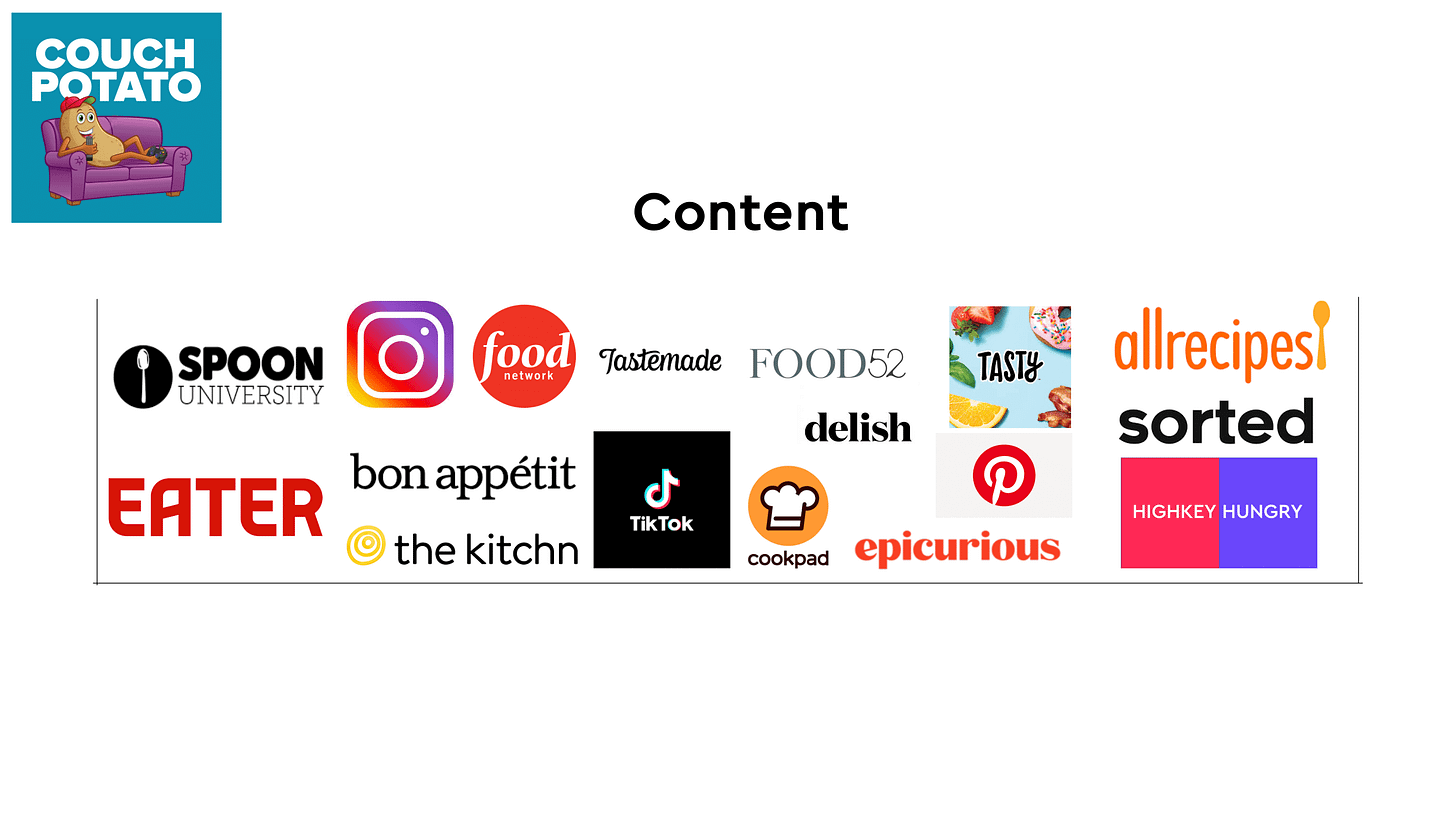
“What should I make?”
Legend says that Adam and Eve couldn’t decide what to cook for dinner so they decided to eat an apple instead. Now if only they had dinner ideas…
- Sub-par user experience
In this phase, the search can be wide (“what to make for food today”) or hyper specific (“what to make with zucchini and garlic powder”).
“The problem is that when I search for ideas, there are three hurdles: trust, ingredients, and time. Do I trust this person’s cooking and palate? Do I have all the ingredients to make this as good as it can be? If not, would my substitutions be good enough? And finally, do I have the time to explore variations and iterations of this recipe? This process is a pain and can be a rabbit hole. Some days it can take hours.”
Ionela Turcin, Founder of Highkey Hungry, passionate home chef
Plus, the experience sucks! Cooking focused blogs over optimize for SEO juice and have way too much fluff content to increase.
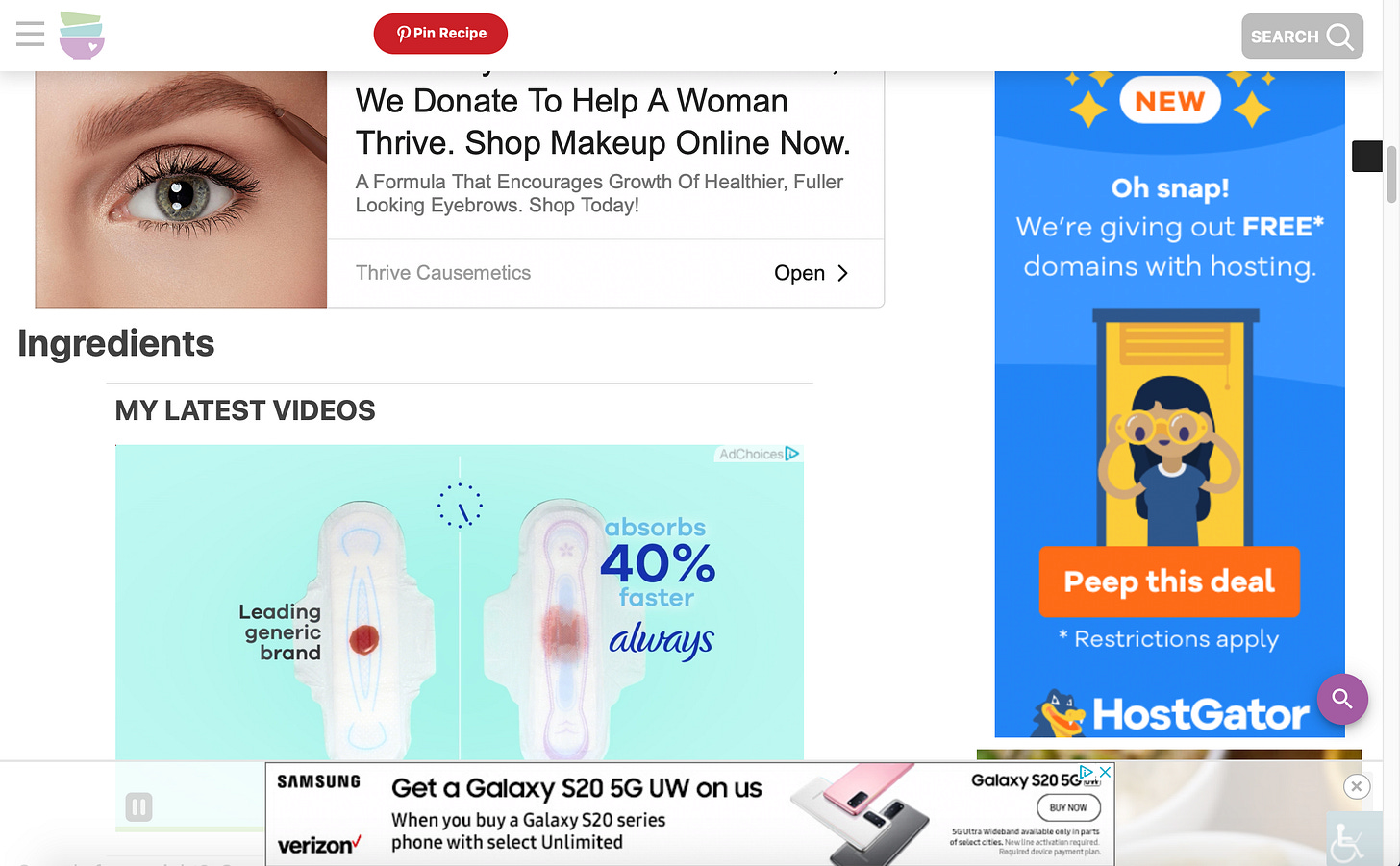
This is what the first three scrolls look like for the top search result for a pasta carbonara recipe. Yikes. Where’s the recipe?
- Inspiration and Entertainment
Instagram is confusing…On one hand, I see everyone’s summer bodies and it makes me jealous. At the same time, it serves up these delicious food photos and now I simultaneously want to lose weight and eat all that food.
In addition, media companies like Bon Appetit, Tasty, Epicurious, and Delish dominate Youtube and social media with their food-focused videos and photos and have built massive followings. Here is a great article by Jerry Lu on how Bon Appetit embraced digital and built a massive business.
The hot new kid on the block in this segment is Tiktok. Creators like @newt and @eitan are growing like wildfire with their 60-second cooking videos with fast cuts. Forget long-form YouTube videos which take too long to watch and are hard to follow along, Tiktok videos might be the new entertainment and discovery engine for food.
- Content Creation Tools (w/ monetization sub-section)
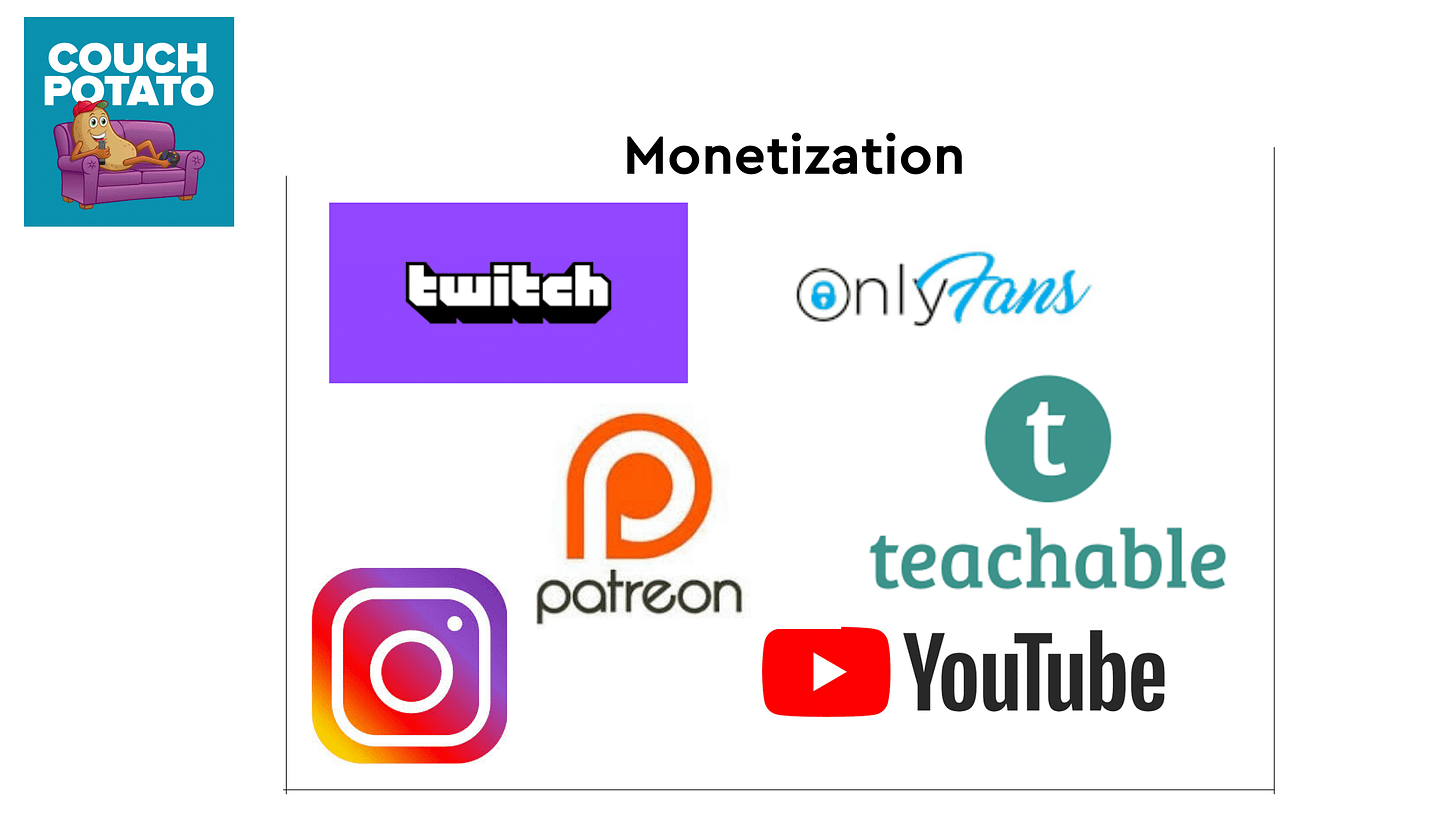
Twitch unlocked supply of content by enabling gamers to become content creators. Cooking is inherently similar in that both the hardcore and the hobbyists are making food everyday. All they need is a way to convert that daily habit into content and a channel to distribute and monetize this passion.
Bon Appetit grew into a lovable brand (pre-2020 scandal) by building their content strategy around relatable home chefs. Not actors. Not professional chefs. Who is going to invert the Bon Appetit model and let home chefs build and own their audience?
Currently there a few players in this space - none directly focused on cooking. Cooking livestreams are gaining popularity on Twitch. Virtual cooking classes with subscriptions can be hacked together using Zoom, zmURL, and Gumroad. Cooking newsletters can build loyal followings using free tools like Substack. You can create and sell cooking classes using Teachable.
There is a good chance that a cooking media focused platform will consolidate these home chefs and give them a way to build, own, and monetize their audience. Kinda like an OnlyFans for cooking. In the meantime, feel free to share your own opinion on this subject, what is your cooking process, what are your favorite food media brands, and what’s your prediction for the future of food media. I look forward to hearing from you!